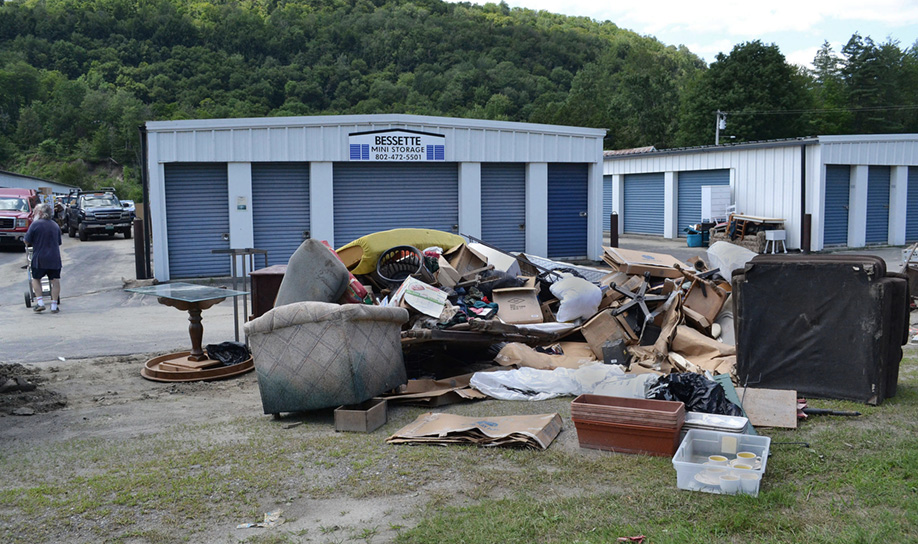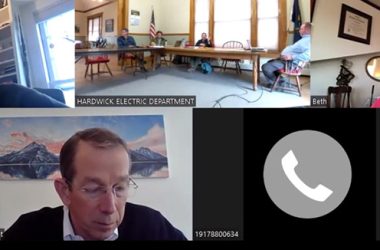
The Lamoille Valley Rail Trail bridge, located along Route 15 East of Hardwick, collapsed during the raging high flood water of the Lamoille River.
HARDWICK – by Elizabeth Dow, Community Journalist HARDWICK – In an attempt to inform and strengthen the Hardwick community after the disastrous flood of July 10, Town Manager David Upson, The Civic Standard, and the American Legion provided a combination select board meeting and community dinner at the American Legion on Wednesday, July 19. Around 100 people attended.
Select board chair Eric Remick opened the meeting and introduced the town manager. Upson reported that on July 10 a rainstorm swept through Hardwick, as it had other Vermont communities. He expressed his conviction that by meeting and talking about what had happened and what individual people and government at all levels had done and could do, the community could get on with the clean-up and return to normal as soon as possible.
Upson reported that early on Monday morning, July 10, the town opened an emergency shelter at Hazen Union. As the day and night progressed, town crews assisted in water rescues and provided support where people needed help.
By the end of the storm, 17 river crossings (bridges, roads, culverts) were damaged or destroyed. In nine days, the individuals, town, and state crews have made all but three of them useable. Only the Fisher’s Folly bridge, Hardwick Farms Road, and Carey Road remain closed. He reported that the town’s business manager had estimated the cost of road work to that point at around $91,500, not including any of the crew’s time or town equipment. Upson expects that the Federal Emergency Management Agency (FEMA) will reimburse the amount.

Contents in units at the Bessette Mini-Storage on Route 14 South in Hardwick were damaged by the high water that overflowed from Cooper Brook during the flooding.
During the flood, the town wastewater treatment plant, fire station, the Memorial Building, a police cruiser, and a truck belonging to the wastewater treatment facility all received serious damage. Estimates for fixing the damage include: the fire station ($85,000 or more), the Memorial Building (around $7,500), and the police cruiser (close to $11,000). After a week, some essential repairs have the wastewater plant running again, but it still has a lot of damage, and Upson asked that people be mindful about when they flush toilets. The town has temporary permission to discharge sewage into the river but want to keep it as clean as possible.
The flood also destroyed Hardwick Electric Department’s (HED) generating station in Wolcott, which provides 15% to 17% of the power HED customers use. HED can buy power from other sources, and estimates the generator will not come back online for about a year.
Throughout the week after the storm, Upson, Remick, and others have met with the Army Corps of Engineers, the Environmental Protection Agency (EPA), the Vermont Department of Environmental Conservation (DEC), Governor Scott, FEMA, and the Small Business Administration (SBA). Fixing the wastewater treatment plant will cost close to a million dollars. At present, the town doesn’t know exactly the full amount, how to pay for it, or how much time fixing it will take.
Upson thanked the road crew, police and fire departments, The Civic Standard, and the Neighbor-to-Neighbor group for helping the town rescue people and animals, distributing supplies, staffing and organizing the meal effort at the emergency shelter, staffing the Senior Citizen building, and helping with taking-in and organizing donations. He announced that if people need any fans, dehumidifiers, cleaning supplies, household items, or other items, they should go to the Senior Citizen building. The distribution center there is open from 7 a.m. to 7 p.m. He asked that if people take any of the bigger items such as fans, dehumidifiers, or shop vacuums, they return them to the Senior Citizen Center or pass them along to a neighbor when they have finished using them. “We need to be able to help each other out,” he said.
Upson offered special thanks to Senator Kesha Ram Hinsdale (D. Chittenden County) for spearheading outside collections and getting supplies to Hardwick. Hardwick received a significant donation from a hardware store in Jericho.
Since the flood, five town staff members, and one volunteer did 50 damage assessments throughout town. Upson encouraged everyone with flood-damaged property, land, or house, to report it to the town and to call 211, a free emergency reporting center.
Upson has placed information on financial assistance for residents on the Town’s website, hardwickvt.gov.
Lastly, Upson reported that dumpsters for public use sit at the Knights of Columbus Hall and on Atkins Field. He asked that people not fill them over the top, because the dumpster then becomes hard for the company to pick up and transport. When Upson finished his report, Remick opened the floor to questions and concerns from the public.
Bill Chidsey, chair of the Hardwick Energy Committee, announced that if anyone needs help or has questions about heating assistance, they should contact the committee at [email protected]. This committee can do a lot to help.
Freda Hollyer and Sharon Fradette spoke about 211. They found it hard to get through to by phone, but found its website, 211.org, very easy to use. Remick again encouraged people to report damage.
Nancy Nottermann reported that she has been in contact with the Farm Service Agency. Any farmer who has had washouts, or property damage should contact the agency, and it will work with farmers. The town gave the Laggis Farm permission to build a bridge on Hardwick Farms Road (on the Center Road side of Hardwick Farms Road) in order to access their crops. The bridge isn’t for the public to use.
Paul Fixx and Sharon Fradette both asked where to get assistance if the river has eaten away land. Upson reported that the Lamoille River Valley will receive a new survey which will document changes in the river’s course. Dave Gross, chair of the Hardwick Planning Commission, reported that updated maps will include changes to the river and its tributaries.
Upson noted that the Vermont State Employees’ Credit Union (VESCU) will make loans for up to $3,000 at 0% interest; he had put more information on the town’s website.
A resident asked what to do about flooded storage bins; Upson advised taking pictures of all the damage.
Annie Houston, grant writer for the Orleans Southwest Supervisory Union, offered to help people apply for grants to cover damages. She left a sheet people could sign up on and gave her email address so people could contact her at [email protected].
Andrea Phelps asked about assistance for house and property damage of more than $40,000. Upson responded that the town is looking into programs for significant amounts like this.
Keira Gann observed that people’s electric bills and water bills will go up because of the power and water needed for the clean-up. She wondered if people will get any assistance on those bills. Remick said he couldn’t speak for the Hardwick Electric Department, so he encouraged homeowners to contact the HED commissioners. The town will go through water bills and if the water meter reading shows a significant increase, the town will work with residents. Gann also observed that residents might not get estimates on the damages until later. Upson responded that they should still let the town know so it can record the information.
Mike Demers asked if the town would provide support to help fix a road off Mackville Road. Upson said yes.
Bill Chidsey asked about creating a central repository for items found along river banks. He lost a Farmall tractor, and he’d like to have it back if someone finds it. The town staff will work on this.
Bob Edebohls, of Jeudevine Falls on Craftsbury Road, asked about taxes and how this storm may affect future taxes. Upson responded that the town must do a new grand list assessment and changes in property value because of flood damage will appear there.
Ellora Stone said that Barton and Glover have a lot of damage and very little help. Neither has the governmental structure Hardwick has. She requested that Hardwick send any surplus supplies to those areas to help neighboring residents out.
Rose Friedmann reminded people about The Civic Standard. She reminded people that they occupy the old Gazette building and have taken in donations and will help financially as much as possible so residents can continue to move forward. If there’s anyone willing to volunteer or contractors willing to look at houses, she asked that they contact the Neighbor-to-Neighbor group at (802) 472-5948.
Remick thanked the town manager and all the staff for all of the efforts that have been made since this storm. He also thanked the residents who have helped. “Without everyone, “he said, “Hardwick wouldn’t be as strong as it is.”
Following the meeting, the Legion served a free meal for all who attended the meeting.
USDA Rural Development Offers Disaster Relief Resources
MONTPELIER – Sarah Waring, state director for USDA Rural Development (RD) in Vermont and New Hampshire, has announced assistance for rural residents to recover and rebuild from the floods occurring on Monday, July 10.
On July 11, President Joe Biden approved FEMA disaster assistance throughout the state, and on July 14, declared six Vermont counties – Chittenden, Lamoille, Rutland, Washington, Windham and Windsor – as major disaster areas. With significant damage still being assessed outside of these areas, additional counties are being considered for the major disaster designation.
“Today, our neighbors need help,” said Waring. “Over the last two weeks, parts of Vermont have been devastated; people with destroyed and damaged homes, towns and villages submerged to windows and rooftops, and farmers, producers and businesspeople who lost their livelihoods in mere minutes. Our USDA Single Family Housing Repair Loans and Grants program will be our first program that can help with recovery. Along with our partners, the Rural Development staff will be on the phone, online, and on the ground in service to Vermonters who could use a helping hand. That is our purpose over the coming weeks and months, to be the very best neighbors we can be in this time of need.”
Changes to the USDA Single Family Housing Repair Loans and Grants program, known as the “504” program, will be extended to homeowners impacted by the floods who meet very low-income eligibility guidelines, including those who are not current USDA customers.
Disaster Relief Changes to the USDA 504 Housing Repair Program include a higher grant maximum, increased from $10,000 to $40,675; and no age restriction: eligible homeowners of any age can apply for disaster-related grant funding.
In addition to the disaster-related changes to the 504 program, for anyone eligible in Chittenden, Lamoille, Rutland, Washington, Windham and Windsor counties current borrowers for USDA RD’s Single Family Housing Direct Loan program will have the option for various extensions, payment moratoriums and waived late fees.
Funding for municipal infrastructure impacted by the floods will be made available through the USDA Community Facilities Loan & Grant program and the Water & Waste Disposal Loan & Grant program. Along with an ongoing partnership with the Federal Emergency Management Agency (FEMA), RD will also work closely with the Small Business Administration (SBA) and other USDA agencies such as the Natural Resources Conservation Service (NRCS) and Farmers Service Agency (FSA), to help farmers, producers and small businesses find and secure funding to accelerate their recovery. State partners in disaster relief efforts include the Vermont Agency of Agriculture, Food & Markets (VAAFM), Agency of Commerce & Community Development (ACCD), and Department of Environmental Conservation (DEC), among others.
A resource document with contact information for various agencies and organizations can be found online at rd.usda.gov/media/file/download/vt-rd-disaster-relief.pdf. For housing inquiries, call (603) 223-6035 (including Vermonters) or write to [email protected]. The Vermont RD Montpelier office is closed until further notice as a result of flood damage. In addition, the main phone system is being re-routed, so if you have trouble reaching a staff person, use the Vermont employee contact page to find another.







